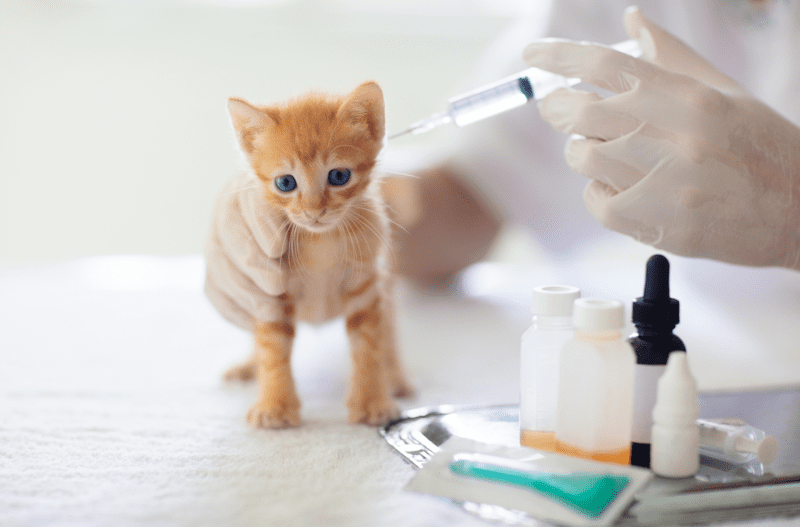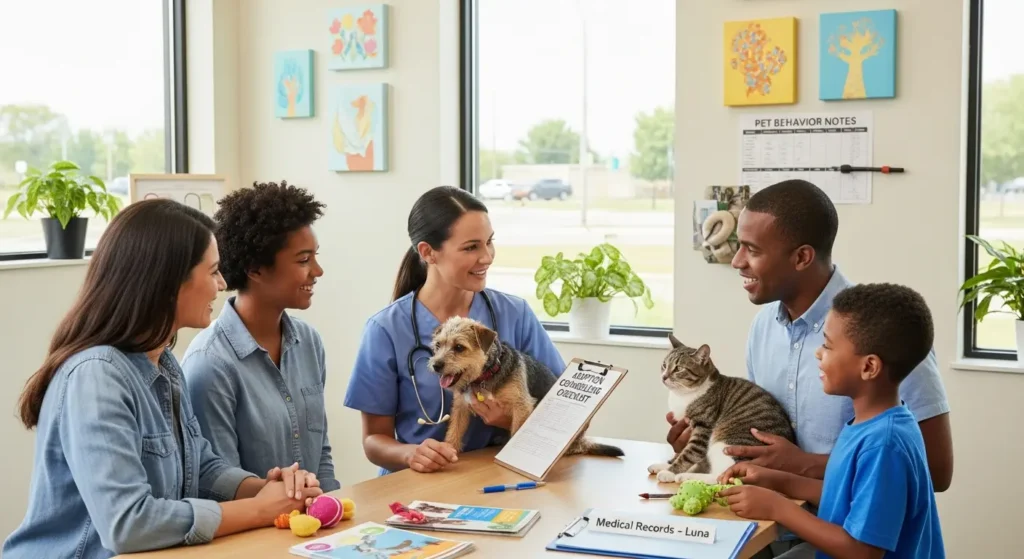Here are the five key questions you must ask the shelter staff, an adoption counselor, or a foster parent before you adopt a pet in Naperville.
Contents
We invite you to explore the services and compassionate care available right here at Sunshine Pet Hospital by calling us at 630-340-3443.

1. What is the Pet’s True Energy Level and Daily Exercise Need?
This is arguably the most important question for long-term compatibility, especially for dog adoption. Energy level is often confused with age, but a young dog isn’t always high-energy, and a senior dog isn’t always a couch potato!
The Naperville Lifestyle Factor
Life in Naperville often involves a balance of work, family, and activities. If you live in a townhome or condo, or if your days are filled with soccer practice and commitments, a dog that needs two hours of intense fetch every day will likely develop behavioral issues due to frustration.
- Low Energy: Does the pet settle easily after a short walk? Are they happy with indoor enrichment games? This is great for apartment living or families with very small children.
- Medium Energy: Does the pet enjoy an hour-long walk or a visit to a DuPage County dog park, but is happy to nap while you work? This is a great fit for active families.
- High Energy: Does the dog constantly need a job? These dogs (often certain Shepherd, Hound, or Pit mixes) do best with dedicated runners, frequent visitors to Springbrook Prairie Dog Park, or people committed to dog sports like agility.
It’s essential to be honest about how much time you can realistically commit to walking and mental stimulation. The counselor at the adopt shelter Naperville IL, facility will match your answer to the pet’s needs, increasing the chance of a successful adoption.
How to Apply This to Cats
When you look to adopt a cat Naperville, the energy question is still vital. A 6-month-old kitten will treat your curtains like a jungle gym, while an 8-year-old cat might be content to snooze on your desk all day. Ask:
- Are they a “lap cat” or a “play cat”?
- Do they need a lot of vertical space (climbing towers)?
- Are they destructive if not played with using a wand toy for 20 minutes a day?
2. What is the Pet’s Background and What Behavior Issues Should I Expect?
Every animal that comes through a shelter has a story. Asking about their history isn’t about being nosy; it’s about preparing for their future. The more you know, the smoother their transition will be.
Decoding the Health and History Report
Shelters like the Naperville Area Humane Society are excellent at providing detailed records. Ask the following specific questions about their health and behavioral status:
- “Why was this pet surrendered, or how did they arrive?”
- Example Answer: “The previous owners moved and couldn’t take him.” (Often a smooth transition).
- Example Answer: “He was found as a stray and has no history.” (Expect a longer period of basic training).
- Example Answer: “He was surrendered due to resource guarding.” (Requires an experienced adopter).
- “How have they performed on their behavioral assessments?”
- This is where you learn if the dog has tested well with other dogs, or if the adopt a cat Naperville candidate is comfortable around men, women, or children.
- “Is there any known separation anxiety?”
- If you work a standard 8-hour day, this is critical. A dog with severe separation anxiety cannot be left alone right away and will require dedicated behavioral training and possibly medication.
Understanding the pet’s “quirks”, like a cat who will only use hooded litter boxes or a dog who is terrified of thunderstorms, allows you to proactively manage their environment and prevent major issues before they start.
3. How Does the Pet React to Kids, Other Animals, and Strangers?
Adopting a pet is like bringing a new family member into your home’s ecosystem. If you already have existing family members, human or animal, the compatibility is non-negotiable.
The Social Dynamics Test
Shelters perform “meet-and-greets” for a reason. Don’t rely on a simple checkmark on a cage card; ask for specifics:
A. Children
- For Dogs: Has the dog been around children of your child’s specific age (toddlers versus teenagers)? A dog that is great with older, calm children might be overwhelmed by a rambunctious 2-year-old.
- For Cats: Does the cat hide from or tolerate children? Some cats view small, loud humans as predators. A shelter counselor can advise if the cat has a “wait-and-see” approach or if it’s completely unsuitable for a home with kids.
B. Other Pets
- If you have a resident dog, the adopt shelter Naperville IL staff will require a meet-and-greet (or “dog-to-dog intro”). Ask them how the initial introduction went and if the pet is “dog-tolerant” (will coexist) or “dog-friendly” (will play).
- If you have a resident cat, ask if the dog candidate has a known prey drive. If the cat candidate has lived harmoniously with dogs before, that is a huge plus!
A mismatch here is the number one reason pets are returned to the shelter. Take the shelter’s guidance seriously; they are trying to ensure the safety and happiness of everyone involved.
4. What Medical Care Has the Pet Received, and What Will They Need Next?
When you adopt a pet in Naperville, you are taking responsibility for their complete health, from vaccines to emergency care. You need to know exactly where you are starting from.
Veterinary Care: The Adoption Checklist
Reputable rescues provide a great start to a pet’s medical journey. You should receive records detailing:
- Spay/Neuter Status: Was the surgery performed? (Almost universally, yes.)
- Vaccinations: Are they current on Rabies, Distemper (DHPP/FVRCP), and Bordetella?
- Testing: Was the dog tested for Heartworm? Was the cat tested for Feline Leukemia (FeLV) and Feline Immunodeficiency Virus (FIV)?
- Microchip: Has the pet been microchipped, and is the shelter’s contact information on file? You will need to immediately update this with your information!
Crucially, ask about any chronic conditions. Does the dog require daily joint supplements? Does the cat need a special diet for kidney health? These issues will affect your long-term budget and time commitment.
Once you have the records in hand, it is imperative to schedule their first check-up with your chosen vet in Naperville. This is the best way to establish a baseline for their long-term health. Knowing the difference between routine care and a crisis is part of responsible ownership. We are proud to serve the Naperville community and are ready to be your pet’s primary care provider.
5. What Kind of Post-Adoption Support Does the Shelter Offer?
A successful adoption is a partnership between you, your pet, and the adopt shelter Naperville IL team. The best shelters view adoption as a start, not an end.
The Lifetime Safety Net
Ask the counselors what kind of follow-up care or support you can expect.
- Behavioral Hotline/Resources: Do they have trainers on staff who can answer questions about house-training setbacks or difficulty integrating a new adopt a cat Naperville addition? Shelters often provide a post-adoption behavioral helpline free of charge.
- Return Policy: While we all hope it never comes to this, understand the shelter’s policy. Most shelters require that if you cannot keep the pet for any reason, you must offer the animal back to the shelter before rehoming it privately. This ensures the pet is never dumped or placed into a bad situation.
- Training/Event Discounts: Some local Naperville shelters partner with pet stores or trainers to offer discounts on starter kits or obedience classes.
Knowing you have a support system in place, both the shelter and your local veterinary team, will give you the confidence to handle the inevitable bumps in the road as your pet adjusts to their new life.
A Commitment to a Lifetime of Health
Adopting a pet is a deeply fulfilling choice, and when you take the time to ask these five key questions, you are making a powerful commitment to that pet’s well-being. Every year, thousands of dogs and cats in DuPage County find their second chance at a home because people choose to adopt a pet in Naperville.
As your trusted partners in health, we want to ensure your new family member gets off to the healthiest start possible. This involves routine check-ups, preventative care, and knowing where to turn when minutes count. This brings us to a final, critical point: be prepared for emergencies. Knowing the location of the nearest emergency vet in Naperville can save your pet’s life one day.
Frequently Asked Questions (FAQ)
Q1: How long does the adoption process typically take to adopt a pet in Naperville?
The timeline varies widely by the individual shelter or rescue group (like the Naperville Area Humane Society or A.D.O.P.T. Pet Shelter). It can take as little as 48 hours, but it often takes 3 to 7 days. This time is used for processing your application, checking vet references, performing a landlord check (if applicable), and scheduling a meet-and-greet to ensure you are the right match. Applying online beforehand can often speed up the initial screening process.
Q2: What is the average cost to adopt a cat in Naperville vs. a dog?
Adoption fees vary by age and species. For dogs, fees can range from $250 to $500, with puppies being on the higher end and senior dogs often being lower or fee-waived. For cats, fees are generally lower, ranging from $75 to $175. The fee covers critical costs, including spay/neuter surgery, initial vaccines, microchipping, and a preliminary vet check.
Q3: What should I bring with me on adoption day?
You should bring a valid photo ID, confirmation of your landlord or HOA’s pet policy (if applicable), a credit card or cash for the adoption fee, and proper transportation. For dogs, this means a fitted collar/harness and a secure leash. For a cat, you must bring a secure, hard-sided carrier. If you don’t have these, most adopt shelter Naperville IL, locations will have them available for purchase.
Q4: Is a home visit required when I adopt a pet in Naperville?
Some local rescues, particularly foster-based ones, may require a virtual or in-person home visit to ensure the environment is safe and suitable for the pet you are looking to adopt. Larger shelters may not require a visit for every adoption, but reserve the right to do so, especially for pets with specific needs, or if you live outside their immediate service area.
Whether you are a brand-new adopter or have been a pet parent for years, we welcome you to the Sunshine Pet Hospital family. Please schedule your appointment to book your new pet’s first wellness exam and ensure their health records are completely up to date. We are here to support your journey every step of the way!


